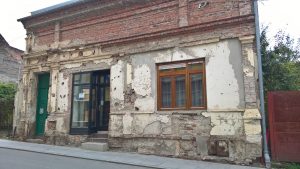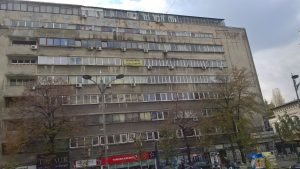How accurate is your memory of the past? Of your family? Of past events? Do you find that siblings, partners or colleagues have contrasting views of an experience you shared? People tend to notice and remember different aspects of a situation or project.
David and I have just been travelling the Danube from Budapest to Bucharest. It was a tour organised by The Daily Telegraph and Emerald Waterways (www.emeraldwaterways.com). The theme was war. We were treated to lectures from BBC foreign correspondents Nick Thorpe, talking about Budapest and the Danube, John Simpson covering the fall of Ceausescu in Romania, and Martin Bell who travelled with us and enlightened us with his experiences of the Croatian Wars. It was a fascinating trip on a luxurious and expertly-run boat and in the company of some delightful, educated and interesting fellow travellers.
I came away with many impressions of post-Communist Eastern Europe and two particular questions kept coming into my mind as we tried to piece together the various narratives we heard from our local guides, the journalists’ lectures and the people we met on the street. First, how do people find the stoicism to survive the terrible personal suffering of war? Something I suspect one can only know by experiencing it and I hope I shall never do so. Second, how do we find the heart of the matter when so many perspectives and personal experiences differ, when memories are often clouded by emotion and filtered by belief? What and where is the truth within these complex events: what is history?
We visited towns and villages in Hungary, Croatia, Serbia, Bulgaria and Romania. In each place we had an individual tour guide and each guide offered a different perspective. This was particularly true in Croatia where the responses to the question of how Croats and Serbs now live together were markedly contradictory. We all had hosted lunches with different families. In our family there were two daughters, their parents and two children. Their experience of the war had been that their house had been 70% ruined by mortar shells and they had escaped to Austria while a Serb family lived in their home for five years. The Serb family had been in touch with them throughout this period and handed them back the key at the end of the war. Now, they told us, Croats and Serbs live happily side by side and go to school together.
Our fellow travellers received strikingly different narratives from the hosts with whom they lunched. They were informed that Croat and Serb children may go to the same school but at different times of the day, so that they don’t mix. Martin Bell confirmed this and reported that even before the war people lived alongside each other because the police made sure there wasn’t trouble. We heard other sad stories of the after-effects of the war where a husband had been killed by chemical gas, young men maimed physically or left with PTSD, some never able to work again. The fact that the family David and I visited seemed to be of an optimistic nature and united as a unit may have made their perspectives of history different from that of others. Each individual we spoke to had experienced distinct events and had inevitably met those events with their own beliefs and points of view.
I was left with a general impression of the miserable legacy of Communism – the hypocrisy of leaders presenting themselves for equality of all people and yet building themselves palaces and pocketing money. The monotonous and grim concrete blocks built in all the five countries we visited that are now crumbling and decrepit. Our guides told us, as we were told in Russia earlier this year, that their parents sometimes harked back to the certainty of those times, even though they were on starvation rations. There had been more-or-less 100% employment and people had the ability to live, albeit at a meagre level. Today nothing is certain and people are frequently living on as little as 400 Euros per month, with rents taking more than half of that income.
Everywhere we went we heard of high unemployment, low wages, derisory pensions, of corruption in high places, of those who were in Communist regimes remaining in some administrative and political roles. And of how the young are moving away to Germany, the US, Ireland, UK because they see no prospect of work in their own countries, depriving those countries of their brightest doctors, lawyers, entrepreneurs who could potentially help rebuild these countries economically.
But I question whether the people who have been privy to occupations or dictatorships find it easy to be entrepreneurial? Communism has treated them as automatons, as groups of people and not as individuals. I wondered, from a neuroscience perspective, whether finding the neurons in the brain to identify innovative opportunities may well not come easily to such people with these histories. After all, their parents lived under Communism and their grandparents often under an authoritarian monarchy, neither of which encourage creative individualism. I don’t believe we can make people think in new ways overnight, any more than we can expect people to embrace democracy overnight when they have not had it for centuries, if ever.
Once again I was struck by how different the history of the UK has been to that of mainland Europe, where they have had centuries of invasions, occupations, dictatorships. We were told that when living under an authoritarian regime people find ways to get around the rules – the black market, whispered deals in corridors to avoid tax, make things happen, or find goods that people want. They call it ‘the loop’. We have not been occupied and have had centuries where our institutions have developed in such a way that most of us abide by what we recognise to be adequately fair rules. Having visited East Europe, Russia and South America over the last couple of years, I am left with a sense that we just don’t know how lucky we are in the UK, that our poverty bears little relation to the kinds of hardship people in these countries are experiencing.
I am no expert and don’t pretend to understand the histories of the countries we visited. But I do think we need to be careful when we are constructing a historical narrative, whether it is about a war, a country, a family or an organisation. Martin Bell was a very enjoyable and insightful companion to have on board the ship with us and brought events alive with his direct experiences of war. And yet explained to us that inevitably if, as a journalist, you are embedded with one group or army unit you gain depth of understanding of their situation at the expense of understanding their enemy, or maintaining a sense of the overall strategy or direction of the war in general.
In his preface to his classic book on the Algerian War, A Savage War of Peace, the historian Alistair Horne writes of how complicated it is to reach any objective truth in a complex and long war, with multiple levels of action and no obvious single focus. A French premier had commented that “only an Englishman” could be adequately objective to see beyond personal perspectives of the Algerian War. In 1580 the French philosopher, Michel de Montaigne wrote that if humans so frequently lack self-knowledge, why should people consider our “facts” about the universe to be reliable?
Post-Communist Eastern Europe consists of many countries who experienced multiple events. Within those events are individual stories, emotions and beliefs about what happened. All perspectives add to the story and have a truth but as these perspectives can be contradictory the real truth of history can be illusory. Montaigne might argue that some humility about our ability to see and remember things clearly is a more realistic description of the fallible human mind. Can we personally be so sure that our own memories of a situation are totally accurate, I wonder?
And a poem inspired by our visit to Vukovar and Martin Bell’s lecture and video clips:
“All Wars are the Worst War” (Sergeant Andy Mason of the Desert Rats)*
The sniper dives behind a shattered door frame,
disappearing into long shadows of waiting.
Time travels both fast and slow
within the confines of his battle.
The windows of the nearby Hotel Dunav are being shot
window by window, floor by floor,
in the concrete Communist block skyscraper
towering over Vukovar’s harbour.
Houses stand bombed and broken.
A neighbourhood street where mothers had cooked,
children had played, grandparents visited,
now unrecognisable. A tumble of jagged bricks and breezeblock.
There’s nowhere to run. Every corner covered,
the wide wild fields of wheat booby-trapped with landmines.
He thinks he is fighting for justice, territory, belief.
He has not lived sufficient years to realize he’s a political pawn.
A mortar blasts and rocks his cover.
He ducks into darkness in the shelled ruin of a shop,
aims his gun into the gloom to discover a fighter
sheltering under the counter, teeth chattering, stupefied in terror.
Snipers firing, snipers being slaughtered, so many being maimed.
No orders reach them. Fear takes over.
Their young-man bravado seeps into the blackness of their hearts,
the futility of war murdering them both in its own way.
*From In Harm’s Way: Bosnia: A War Reporter’s Story by Martin Bell. See this and other poems on this link:



One Response
Re. Finding ‘The Truth’ about any war, I don’t think there is such a thing as a historic truth re. wars. It is by studying the accounts of opposing sides that you can gain some sort of insight, but you will probably find that ‘the history of a war’ is quite often written by the victorious side.